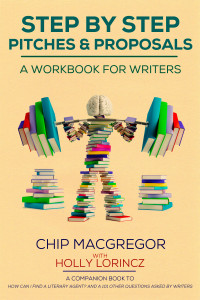What does a good query letter look like?
I’ve had three different people ask me about query letters recently… specifically, “What does a query letter look like?” and “What goes into a good query to an agent?”
Happy to help. To query an agent or editor is to simply approach someone and introduce your book 
idea. The goal of your query is to get them to read your proposal. (Let me repeat that: your goal in sending an agent a query is to get them to read your proposal. No industry professional has the time to look out the window, much less sit down and read your entire unsolicited manuscript.) So you entice them with your pitch, get them to want to see the writing, and then give them the details in a quick, industry standard proposal — then you walk away, praying they’re going to want the full manuscript. The goal of a query is not to move them from “I don’t know you” to “let me make an offer on your book.” The goal is to move them from “I don’t know you” to “hey, your book sounds interesting… I’ll have a look.”
If you are sending a query letter, it should be only three to four paragraphs long and contain your pitch, your writing bio, the manuscript status, and some comparable titles. If you are querying face-to-face at a conference, where you’ve signed up for appointments with editors and agents, your query will have these same elements, beginning with a verbal pitch lasting no longer than two or three minutes.
And, of course, before you even consider querying, you need to make sure your manuscript draft is honed and polished, including a developmental edit (i.e., has your novel’s plot or structural flaws been revised? In a nonfiction book, is your overall argument complete and logical?) and a final proofreading, preferably from a professional editor. If you are serious about publishing, you need to take yourself—and your manuscript—seriously.
Here are the elements we think you need to include in your query letter:
FIRST PARAGRAPH:
Try to introduce yourself in one to two sentences that will establish a connection. “I am writing to you because your client, Heidi Gray, offered to introduce us” or some such thing. Nothing over the top or hokey. Maybe “I am writing to you because you represented Secrets of a Charmed Life, by Susan Meissner, and I feel my work will have a similar audience.”
SECOND PARAGRAPH:
Introduce the Hook and Need, or Story, from your pitch. If a novel, be sure to include the conflict and what’s at stake for the protagonist. If this is nonfiction, you need to describe how the information is organized (i.e., “Part One describes the history, Part Two is the problem, Part Three is the solution”), and why your take is unique and worthwhile for today’s audiences.
THIRD PARAGRAPH:
Refer to your writing credentials, but keep it short and interesting and describing why you wrote this particular book — establishing yourself as the authority in the topic area if this is nonfiction. List credits, but not minor ones. Ditto endorsements or awards. We don’t need to know about your personal life, or even your career, unless it’s related to writing skills, your topic, or your ability to build a platform (e.g., definitely mention if you work for a morning show with a stable audience, or if you are writing about a crime and are a forensics expert). Discuss your publishing history, awards, industry connections, pertinent education or experiences, and your platform (what are some different ways you can reach people to help sell your books, like websites, professional organizations, or media you can access?).
FOURTH PARAGRAPH:
Include the word count and manuscript completion date, the target audience, and comparable titles. Also important to include is the pertinent market information (“two out of three crime bestsellers are PI novels, similar to mine”).
FORMAL CLOSE:
Close by mentioning you are attaching your proposal and what it includes. Be thankful of their time. Make sure you’ve included your contact information, including a phone number and email address.
Does that help? What other questions about queries do you have?
===============================
This post is based on the information found in Step by Step Pitches and Proposals: A Workbook for Writers, by Chip MacGregor and Holly Lorincz. You can order a print or digital copy here. And if you like it, please give us a nice review on Amazon!


3 Comments
I have a beginner’s question on paragraph three. What if this is a first novel and the only credit is a minor online one? Or, there are no writing credits at all?
Pray harder. No, Seriously. Chip has said it in the past and I believe it. There has not ever been a great writing that has not been published. Keep improving and researching.
If you’ve got a minor credit, I’d probably still list it, Nora. But A.E. is right — what matters most for a debut novelist is that the writing is great. Get that done, and you’ll be much farther along.